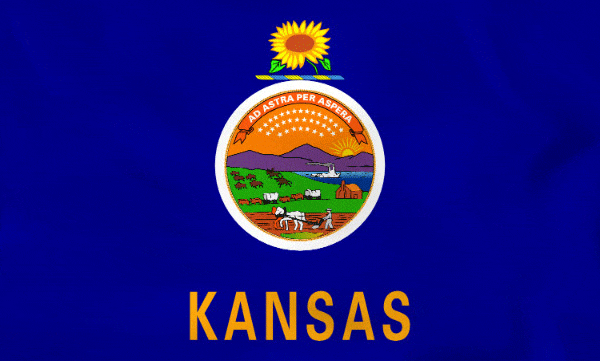Kansas
State abbreviation/Postal code: Kans./KS Governor: Sam Brownback, R (to Jan. 2019) Lieut. Governor: Jeff Colyer, R (to Jan. 2019) Senators: Jerry Moran, R (to Jan. 2023); Pat Roberts, R (to Jan. 2021) Historical biographies of Congressional members Secy. of State: Kris Kobach, R (to Jan. 2019) Treasurer: Jacob LaTurner, R (to Jan. 2019) Atty. General: Derek Schmidt, R (to Jan. 2019) Organized as territory: May 30, 1854 Entered Union (rank): Jan. 29, 1861 (34) Present constitution adopted: 1859 Motto: Ad astra per aspera (To the stars through difficulties)
Nicknames: Sunflower State; Jayhawk State Origin of name: From a Sioux word meaning “people of the south wind” 10 largest cities (2014): Wichita, 385,577; Overland Park, 178,919; Kansas City, 147,268; Olathe, 130,045; Topeka, 127,939; Lawrence, 89,512; Shawnee, 63,622; Manhattan, 56,069; Lenexa, 49,398; Salina, 48,045 Land area: 81,815 sq mi. (211,901 sq km) Geographic center: In Barton Co., 15 mi. NE of Great Bend Number of counties: 105 Largest county by population and area: Johnson, 559,836 (2012); Butler, 1,428 sq mi. State parks: 24 Residents: Kansan 2014 resident population: 2,904,021 2010 resident census population (rank): 2,853,118 (33). Male: 1,415,408 (49.6%); Female: 1,437,710 (50.4%). White: 2,391,044 (83.8%); Black: 167,864 (5.9%); American Indian: 28,150 (1.0%); Asian: 67,762 (2.4%); Other race: 110,127 (3.4%); Two or more races: 85,933 (3.0%); Hispanic/Latino: 300,042 (10.5%). 2000 population 18 and over: 2,126,179; 65 and over: 376,116 (13.2%); median age: 35.9. |
Spanish explorer Francisco de Coronado, in 1541, is considered the first European to have traveled this region. Sieur de la Salle's extensive land claims for France (1682) included present-day Kansas. Ceded to Spain by France in 1763, the territory reverted to France in 1800 and was sold to the U.S. as part of the Louisiana Purchase in 1803.
Lewis and Clark, Zebulon Pike, and Stephen H. Long explored the region between 1803 and 1819. The first permanent white settlements in Kansas were outposts—Fort Leavenworth (1827), Fort Scott (1842), and Fort Riley (1853)—established to protect travelers along the Santa Fe and Oregon Trails.
Just before the Civil War, the conflict between the pro- and anti-slavery forces earned the region the grim title of Bleeding Kansas.
Today, wheat fields, oil-well derricks, herds of cattle, and grain-storage elevators are chief features of the Kansas landscape. A leading wheat-growing state, Kansas also raises corn, sorghum, oats, barley, soybeans, and potatoes. Kansas stands high in petroleum production and mines zinc, coal, salt, and lead. It is also the nation's leading producer of helium.
Wichita is one of the nation's leading aircraft-manufacturing centers, ranking first in production of private aircraft. Kansas City is an important transportation, milling, and meat-packing center.
Points of interest include the Kansas History Center at Topeka, the Eisenhower boyhood home and the Eisenhower Memorial Museum and Presidential Library at Abilene, John Brown's cabin at Osawatomie, re-created Front Street in Dodge City, Fort Larned (an important military post on the Santa Fe Trail), Fort Leavenworth, and Fort Riley.
See more on Kansas:
Encyclopedia: Kansas
Encyclopedia: Geography
Encyclopedia: Economy
Encyclopedia: Government
Encyclopedia: History
Monthly Temperature Extremes
All U.S. States: Geography & Climate
Printable Outline Maps
Record Highest Temperatures
Record Lowest Temperatures
Highest, Lowest, and Mean Elevations
Land and Water Area
All U.S. States: Population & Economy
Historical Population Statistics, 1790–Present
Per Capita Personal Income
Minimum Wage Rates
State Taxes
Federal Government Expenditure
Percent of People in Poverty
Births and Birth Rates
Homeownership
Percentage of Uninsured by State
All U.S. States: Society & Culture:
Most Livable States
Healthiest States
Most Dangerous States
Smartest States
Crime Index
Residency Requirements for Voting
Compulsory School Attendance Laws
Driving Laws
National Public Radio Stations
Selected famous natives and residents:
- Roscoe “Fatty” Arbuckle actor;
- Clarence D. Batchelor political cartoonist;
- Gwendolyn Brooks poet;
- Walter P. Chrysler auto manufacturer;
- Clark M. Clifford secretary of defense;
- John Steuart Curry painter;
- Charles Curtis vice president;
- Robert Dole senator;
- Aaron Douglas painter;
- Amelia Earhart aviator;
- Dwight D. Eisenhower general and president;
- Milton S. Eisenhower educator;
- Gary Hart politician;
- William Inge playwright;
- Walter Johnson baseball pitcher;
- Osa L. Johnson documentary film producer;
- Buster Keaton comedian;
- Emmett Kelly clown;
- Stan Kenton jazz musician;
- James Lehrer broadcast journalist;
- Edgar Lee Masters poet;
- Hattie McDaniel actress;
- Karl Menninger psychiatrist;
- Gordon Parks film director;
- ZaSu Pitts actress;
- Samuel Ramey opera singer;
- Charles Robinson statesman and first governor;
- Charles (Buddy) Rogers actor;
- Damon Runyon journalist;
- Gale Sayers football player;
- Eugene W. Smith photojournalist;
- Milburn Stone actor;
- John Cameron Swayze news commentator;
- William Allen White journalist;
- Charles E. Whittaker jurist;
- Jess Willard boxer.


